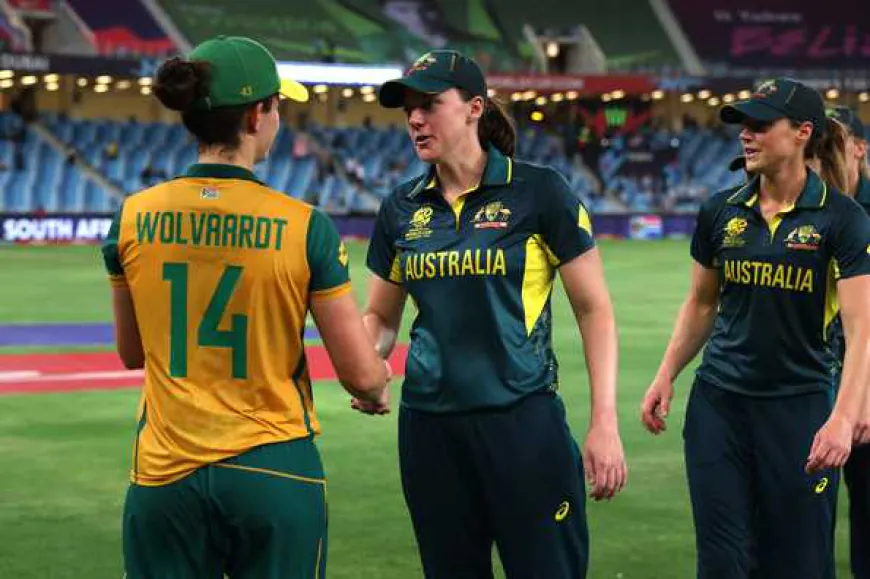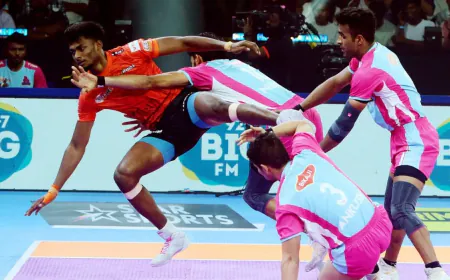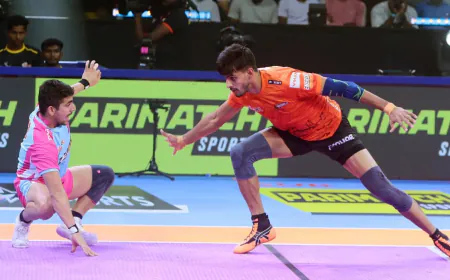McGrath Reflects on South Africa’s Strong Chase and Australia's T20 World Cup Exit
South Africa’s bowlers had a clear strategy, focusing on taking the pace off the ball and attacking the stumps. McGrath acknowledged that the slow pitch didn’t allow Australia’s batters to play with the freedom they had hoped for. "We found the ball was not quite coming on as nice as we would have liked. South Africa took the pace off really well and bowled very straight to us. We tried to consolidate, rotate the strike, and then take the game on, but they bowled really well," McGrath explained.

Australia’s stand-in captain, Tahlia McGrath, acknowledged that her team fell short of a competitive total as the six-time champions were knocked out of the 2024 T20 World Cup. They suffered an 8-wicket defeat to South Africa in the first semifinal, held on October 17 in Dubai. McGrath admitted that despite their efforts, South Africa’s disciplined bowling and efficient chase outclassed the Australians.
The match started with Australia opting to bat, but they struggled to find momentum. After losing Grace Harris and Georgia Wareham early, Australia switched to a more cautious approach, focusing on consolidating the innings. Beth Mooney and McGrath put together a partnership, but their slow scoring left Australia unable to build pressure. Mooney managed 44 runs off 42 balls, while McGrath contributed 27 runs from 33 deliveries. Their 50-run partnership took 55 balls and yielded only five boundaries, reflecting South Africa’s tight bowling efforts.
Australia’s scoring struggles were evident early on, as they managed only 35 runs in the powerplay and 53 by the midway point of their innings. McGrath praised South Africa’s bowling for making it difficult to accelerate, saying, "Early on batting we thought it was a pretty tricky wicket. South Africa bowled really well...they took the pace off and made it hard for us to take risks."
She admitted that Australia’s total of 134/5 was likely below par, but she believed it could still be defended with disciplined bowling. "We still thought we were in the game...if we bowled well enough, that was a competitive total," McGrath said. However, South Africa’s chase, led by Anneke Bosch's unbeaten 74 off 48 balls, made the target seem inadequate. McGrath conceded, "They made it look like a pretty good wicket when they batted, and we were just slightly off with our plan."
South Africa’s bowlers had a clear strategy, focusing on taking the pace off the ball and attacking the stumps. McGrath acknowledged that the slow pitch didn’t allow Australia’s batters to play with the freedom they had hoped for. "We found the ball was not quite coming on as nice as we would have liked. South Africa took the pace off really well and bowled very straight to us. We tried to consolidate, rotate the strike, and then take the game on, but they bowled really well," McGrath explained.
Throughout the innings, McGrath and her teammates constantly communicated, trying different tactics to build momentum. However, South Africa’s bowlers maintained their pressure, and Australia’s innings never fully took off. "We were certainly trying...we tried almost everything. We were constantly communicating, constantly trying to come up with a plan. It just didn’t go our way, and we probably left a few runs out there," McGrath added.
The contrast between the two teams became stark during South Africa’s chase. Bosch, playing a match-winning innings, partnered with captain Laura Wolvaardt in a 96-run stand for the second wicket. Bosch’s attacking approach, supported by Wolvaardt’s composed 42, quickly put Australia on the back foot. McGrath praised South Africa’s batting performance, acknowledging that Australia had hoped for a breakthrough but couldn’t stop the flow of runs. "We started reasonably with the ball, but they really took it to us and tried to put pressure on the first couple of balls of all our bowlers," McGrath said.
Throughout South Africa’s innings, Australia kept hoping for a momentum shift. McGrath noted that a few quick wickets or a couple of tight overs might have turned the game around, but South Africa’s batters remained in control. "We just kept saying a couple of wickets, a couple of quiet overs and the game would swing back our way. But we couldn’t manage to do that...they batted really well, and we were slightly off, so probably a combination of the two," McGrath admitted.
Shelley Nitschke, Australia's head coach, echoed McGrath’s sentiments, acknowledging that Australia had aimed for a higher total but fell short. Initially, they targeted a score of around 160, but as the innings progressed, they recalibrated their expectations to 140-150. Unfortunately, even that revised target proved elusive, and Australia finished with 134/5. "We were aiming for 160, but as the game played out, we knew that was going to be a push by the halfway mark," Nitschke said.
Despite falling short of their desired total, Nitschke believed the score was still defendable. "I think we had a defendable total, but we still needed to bowl really well. We probably didn’t execute what we had in the past," she remarked. Nitschke pointed out that they had been successful on similar pitches earlier in the tournament, but this time, South Africa’s superior execution made the difference.
Reflecting on the approach with the bat, Nitschke emphasized that they hadn’t planned to go all-out from the start but rather to build innings with clear intent. "It wasn’t about trying to blast everything from the start. It was more about having good intent and knowing where to find boundaries," she explained. However, Australia’s batters found it difficult to find the gaps, and by the time they tried to accelerate, the pressure from South Africa’s bowlers was too much to handle.
In contrast, South Africa’s chase was assertive from the start, with Bosch leading the charge. Her aggressive stroke play quickly put Australia on the defensive, and despite their efforts, Australia couldn’t regain control of the match. The Proteas reached the target with 2.4 overs to spare, a comfortable and convincing victory that sent them into the final.
Ultimately, Australia’s exit from the tournament marked the end of their hopes for a seventh T20 World Cup title. McGrath and Nitschke both emphasized that their team had fought hard, but South Africa simply outplayed them on the day. For Australia, it was a tough defeat, but they will undoubtedly regroup and look to bounce back in future competitions. South Africa, meanwhile, will head into the final with confidence, having beaten one of the most successful teams in women’s T20 history.





















































